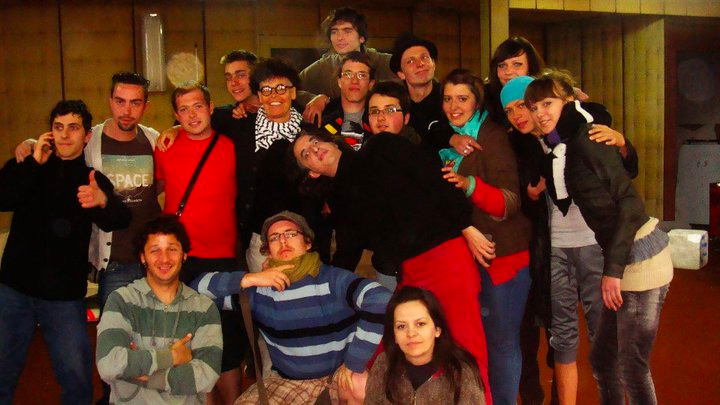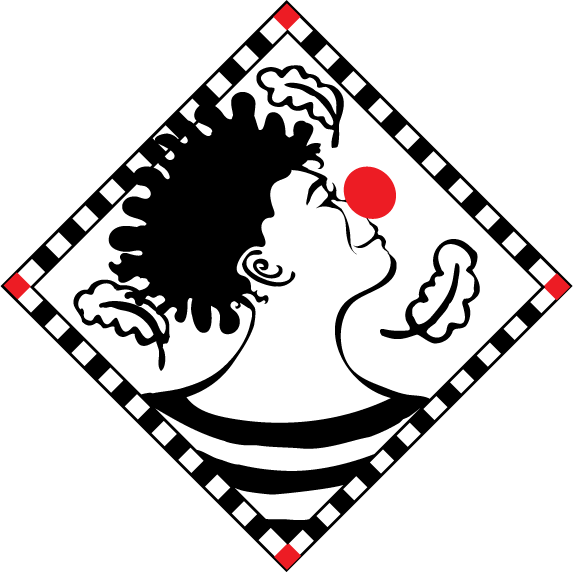Performance Workshops

Iman with students at Workshop in Scopje, Macedonia
Iman Lizarazu teaches workshops in Eccentric Performing, Comedia del Arte, Juggling, and Circus Skills. These workshops are designed to help performers and non-performers alike, and will expand your ability to create, and promote your capacity to solve problems in unusual ways. For performers, these workshops will help you build complicity with the audience, and give you fresh ideas for new material and expanding your existing work. Non-performers who would benefit from these events include public speakers, teachers, lawyers, and anyone who deals with the public. These workshops are intended to enrich and enhance each participant’s outlook and imagination.
Book a Workshop!
Contact Iman
My take on Eccentric Performing
I find “eccentric performing” to be the most sophisticated form of clowning. This particular genre emerged approximately 100 years ago in Russia, with eccentrism referring to novelty skits highlighting the absurd and the illogical with elements of surprise thrown in.
Personally, I see eccentric performing as an opportunity for the clown to tap any genre, subject matter, skill set, and area in the realms of art and science. Eccentric performing is in fact interdisciplinary. When it comes to studying and presenting, nothing is taboo or out-of-bounds for eccentric clowns if they want to continue to evolve in their art.
This unique perspective is also part of my life. Inevitably, what I do on stage is a reflection of what I have experienced and it gives my performance an authenticity that the audience can relate to.
I make a point of studying all aspects of life: front-and back-page news, science, poetry, music, politics and religion. I am in a continuous state of learning and always keep an open mind – and that includes bearing witness to the unexpected.
Once I have my subject matter, I use all the circus, music, language and acting skills in my repertoire to convey the story and bring my stage character to life. The audience can get behind this “person” because it can relate to the credibility of the character and the universality of the situation.
Typically, the situation involves problems and mishaps that end up being solved in unusual, surprising and funny ways.
Something magical happens when all of these ingredients are artfully combined and the outcome is a wonderful, heart-warming show – whether performed on a stage, at a circus, in the street, in hospitals or in refugee camps.
-Iman
Clown's Principles of Eccentric Performing
As seen on the website of her mentors and teachers, Julie Goell and Avner the Eccentric, here are the Clown’s Principles of Eccentric Performing and Working with Volunteers. Thses are the principles which inform Iman’s teaching. Click here to download the PDF version.
- Clown’s job is to make the audience feel things, and to get the audience to breathe.
- Everyone inhales, but many of us need to be reminded to exhale.
- The imagination and the brain are connected to and affect the body. Any change in the mind has a corresponding change in the body. Any change in the body (i.e. in the breath first) has a corresponding change in the mind.
- Don’t tell or show the audience what to think, do, or feel.
- Don’t tell or show your partners what to think, do, or feel. Don’t point.
- Weight belongs on the underside. Keep a single point in your lower abdomen. Keep your energy flowing.
- Tension is your enemy. It produces emotional, mental and physical numbness.
- How you feel about your performance is what counts, not whether it is in reality good or bad.
- The clown discovers an audience who are sitting in rows and looking at an empty space and waiting for a show. This must be dealt with first, by establishing complicity with the audience.
- The clown creates a world in the empty space, rather than entering into a world that already exists (sketch).
- Use mime to create fantasy, not to re-create reality.
- The clown searches to create a game and to define the rules, which then must be obeyed.
- Don’t ask or tell the audience how they feel or think. Have an emotional experience and invite the audience to join in your reaction.
- Be interested, not interesting.
- Everyone must breathe all the time, even when on stage.
- The clown enters the stage to do a job, not to get laughs. If there are laughs, it is an interruption that must be dealt with.
Working With Volunteers
“That looked like fun. Maybe I will be chosen next.”
- Make your volunteer look good. Goal should be for the rest of the audience to say to themselves, “That looked like fun. Maybe I’ll get picked next time.”
- Get agreement before making contact - come with a proposition.
- Be clear what you want the volunteer to do.
- Enter the prospective volunteer's space. Don’t be afraid of rejection.
- Their enjoyment is your employment.
- Never pull someone on stage who doesn’t want to go If volunteer is uncomfortable, or uncooperative, return him to his seat and apologize nicely so next volunteer knows he will be treated well.
- Take the blame if the volunteer screws up. Example: If the volunteer throws a ball over your head, rather than to your hand, react as if you were in the wrong place, rather than that the ball was thrown badly.
- If the volunteer is happy, the audience will be happy. Take the time to be sure your volunteer is breathing.
- Use verbal and non-verbal yes-sets.
- Always reassure volunteer that they are doing well, and that whatever they do is correct.
- Find verbal and non-verbal tactics to get a volunteer.
